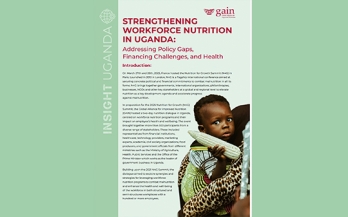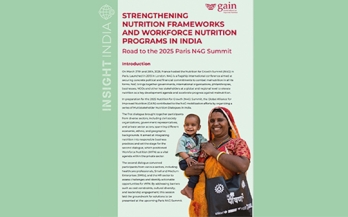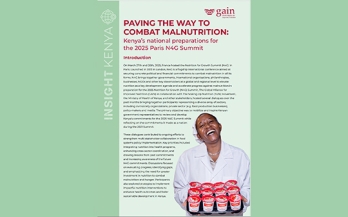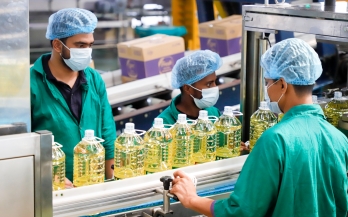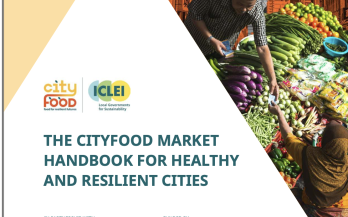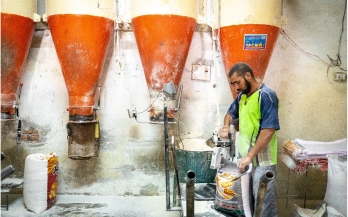While there is a growing recognition of the importance of youth engagement in food system decision-making and governance, existing research remains largely theoretical or anecdotal, with a scarcity of empirical studies providing robust data on the engagement and meaningful participation of young people in food systems. A first step towards providing such data is having strong, validated metrics and data-collection methods that can be applied comparably across contexts. This scoping review thus synthesises evidence on metrics and methods used to assess youth engagement in policy processes, with a specific focus on food system-related policies.
On March 27th and 28th, 2025, France hosted the Nutrition for Growth Summit (N4G) in Paris. Launched in 2013 in London, N4G is a flagship international conference aimed at securing concrete political and financial commitments to combat malnutrition in all its forms. N4G brings together governments, international organisations, philanthropies, businesses, NGOs and other key stakeholders at a global and regional level to elevate nutrition as a key development agenda and accelerate progress against malnutrition. In preparation for the 2025 Nutrition for Growth (N4G) Summit, the Global Alliance for Improved Nutrition (GAIN) hosted a two-day nutrition dialogue in Uganda, centred on workforce nutrition programs and their impact on employee’s health and wellbeing.
On March 27th and 28th, 2025, France hosted the Nutrition for Growth Summit (N4G) in Paris. Launched in 2013 in London, N4G is a flagship international conference aimed at securing concrete political and financial commitments to combat malnutrition in all its forms. N4G brings together governments, international organisations, philanthropies, businesses, NGOs and other key stakeholders at a global and regional level to elevate nutrition as a key development agenda and accelerate progress against malnutrition.
On March 27th and 28th, 2025, France hosted the Nutrition for Growth Summit (N4G) in Paris. Launched in 2013 in London, N4G is a flagship international conference aimed at securing concrete political and financial commitments to combat malnutrition in all its forms. N4G brings together governments, international organisations, philanthropies, businesses, NGOs and other key stakeholders at a global and regional level to elevate nutrition as a key development agenda and accelerate progress against malnutrition.In preparation for the 2025 Nutrition for Growth (N4G) Summit, The Global Alliance for Improved Nutrition (GAIN) in collaboration with The Scaling Up Nutrition (SUN) Movement, the Ministry of Health of Kenya, and other stakeholders, hosted several dialogues over the past months bringing together participants representing a diverse array of sectors, including civil society organizations, private sector (e.g. food production businesses), policy-makers and media. The primary objective was to mobilize and inspire Kenyan government representatives to review and develop Kenya's commitments for the 2025 N4G Summit while reflecting on the commitments it made as a nation during the 2021 Summit.
On March 27th and 28th, 2025, France hosted the Nutrition for Growth Summit (N4G) in Paris. Launched in 2013 in London, N4G is a flagship international conference aimed at securing concrete political and financial commitments to combat malnutrition in all its forms. N4G brings together governments, international organisations, philanthropies, businesses, NGOs and other key stakeholders at a global and regional level to elevate nutrition as a key development agenda and accelerate progress against malnutrition. In preparation for the 2025 Nutrition for Growth (N4G) Summit, the Global Alliance for Improved Nutrition (GAIN) and the Civil Society Scaling Up Nutrition in Nigeria (CS-SUNN) hosted a Stakeholder Nutrition Dialogue in Nigeria to support the Government of Nigeria in defining the commitments to be presented at the upcoming summit.
On March 27th and 28th, 2025, France hosted the Nutrition for Growth Summit (N4G) in Paris. Launched in 2013 in London, N4G is a flagship international conference aimed at securing concrete political and financial commitments to combat malnutrition in all its forms.
N4G brings together governments, international organisations, philanthropies, businesses, NGOs and other key stakeholders at a global and regional level to elevate nutrition as a key development agenda and accelerate progress against malnutrition. In preparation for the upcoming 2025 N4G Summit, the Global Alliance for Improved Nutrition (GAIN) hosted two nutrition dialogues in Pakistan to help raise awareness on the N4G Summit and mobilize public and private sector actors to help address malnutrition.
This white paper explores the nexus between food systems, infrastructure and energy provided by off-grid solar (OGS) systems.8, 9, 10 The efficiency, sustainability, and productivity of food systems are deeply intertwined with energy use.11 The agricultural sector accounts for 30% of global energy consumption and requires power for food production, storage, transportation and processing. The infrastructure used to power food systems is heavily reliant on fossil fuels, accounting for at least 15% of fossil fuel use globally.12 However, in sub-Saharan Africa, agricultural production consumes significantly less energy than the global average. This limits opportunities for value addition, increases food waste due to inadequate storage and processing facilities, and contributes to low agricultural yields.
Food systems, important for food security, nutrition, prosperity, and environmental well-being, are integral to all 17 Sustainable Development Goals. Traditional food markets are strategic entry points for food systems transformation, since a diversity of stakeholders (including local producers, vendors, consumers, and government), interact routinely in these spaces. These markets connect millions of stakeholders within and across local food systems and levels of government mandates. As food-insecure regions like sub-Saharan Africa (SSA) rapidly urbanise, most urban, low-income, vulnerable communities are reliant on food purchased from markets. As such, markets are key spaces to guide vendor practices, influence consumer food choices, and strengthen inclusive governance. Despite their critical value, markets’ ‘hard’ (structures and equipment) and ‘soft’ (capacities and resources) infrastructure are significantly under-supported. Investment efforts have been challenged by a lack of understanding of how markets are embedded in the wider food system and markets’ wholesale and retail dynamics, inadequate financial models, insufficient public budgets and capacity, and limited empowerment of key stakeholders.
This paper introduces and illustrates GAIN’s Inclusive Food Systems Governance Model and supporting tools. The model is designed to strengthen investment and empower voices, alongside increased efforts to ensure sustainability and resilience in traditional food markets. It has been shown to support effective market infrastructure investments, to foster local agency and inclusive and equitable food systems transformation, and to be adaptable across different contexts. The case of Marikiti Market, Machakos County (Kenya) shows the model in action, including details of specific investment components and costs. As infrastructure investments are limited, the importance of making a sound business investment case for public and private (and philanthropic) partnerships and banks to invest in traditional markets is critical.
As cities around the world grapple with rising food insecurity, climate pressures, and deepening inequalities, food markets play a critical role in building healthier, more equitable, and climate-resilient urban food systems.
Packaging can keep foods safe; help make them appealing, convenient, and long-lasting; and convey key information about them to consumers. At the same time, packaging is an important contributor to food system waste and a major driver of certain foods’ prices in LMICs. As such, it is a sector ripe for creative disruption as part of food system transformation – to ensure safe, nutritious foods can reach the consumers who need them, in affordable forms and with limited negative environmental impact. This paper has considered in detail three packaging innovations that could be used to make nutritious foods more accessible to lower-income consumers: single-serve packaging, reusable packaging, and selling products in bulk without individual packaging.


